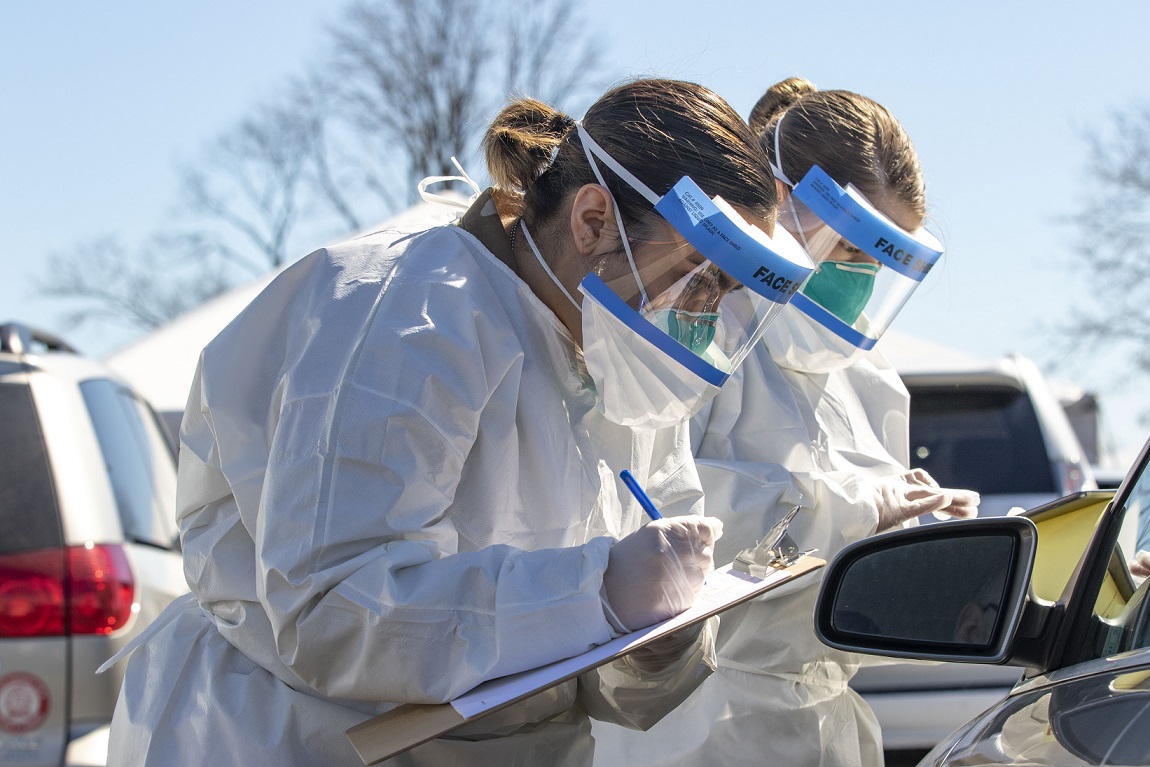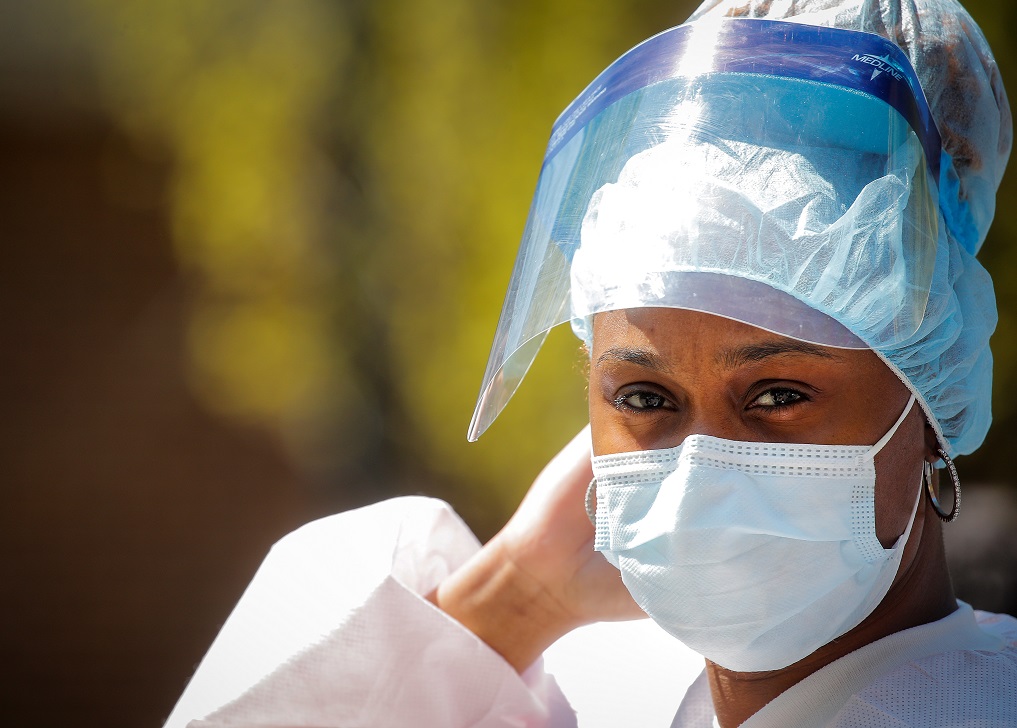Villanova University’s Fitzpatrick College of Nursing Launches National COVID-19 Study of Health Care, First Responder and Service Workers
COVID-19 CHAMPS Study to examine data on physical and mental health and well-being of workers potentially exposed to the virus

Frontline healthcare workers at a New York National Guard COVID-19 mobile test site. (Photo Credit: New York National Guard/Creative Commons)
VILLANOVA, Pa. – The M. Louise Fitzpatrick College of Nursing at Villanova University has launched the national COVID-19 Caring About Health for All Study (CHAMPS) of health care, first responder and service workers for the health care system during the COVID-19 pandemic.
Managing the health care needs of COVID-19 patients has had a tremendous impact not only on the lives of those delivering health care directly but on those who support that effort, from ambulance drivers to maintenance and housekeeping staff whose service has been essential to maintain the health care enterprise. All of them have one thing in common: they are at increased risk of exposure to the virus as well as disruption of their personal and social lives. The COVID-19 CHAMPS Study is designed to understand the immediate effects, as well as the long-term effects on their health, lives and careers.
The objective of CHAMPS is to assess the short and long-term physical, social and behavioral health of all who were involved in supporting or delivering care for COVID-19 patients. It will also serve as a registry for future, hypothesis-driven sub-studies of behavioral and biological coping mechanisms and allostatic load (wear and tear on the body), as well as randomized clinical trials. Participants will be recruited throughout the United States and its territories (Puerto Rico, Guam, the U.S. Virgin Islands) with outcomes followed longitudinally for 20 years.
This study will obtain data on the physical and mental health and well-being of workers potentially exposed to the SARS-CoV-2 virus in the course of their duties. Included are a broad range of occupations such as those working in the community (police officers, firefighters, emergency personnel, screening staff) as well as in permanent or temporary sites that care for patients (service staff, nurses, physicians and other health professionals).
“It is vital that we learn from this experience and understand the broad scope of the impact on the health of those on the front lines, their potential future health needs and to contribute knowledge to inform public health strategies that provide effective care when similar crises develop in the future,” says Donna S. Havens, PhD, RN, FAAN, Connelly Endowed Dean of the Fitzpatrick College of Nursing.
The CHAMPS Steering Committee at the College is chaired by Peter Kaufmann, PhD, associate dean of Research and Innovation and principal investigator of CHAMPS. His experience in large, multi-site clinical trials and observational studies was acquired at the National Heart, Lung and Blood Institute, part of the National Institutes of Health. He is joined by Dr. Havens, a health services researcher with broad international experience and research addressing the nursing practice environment and the quality of patient care in hospitals and emergency rooms. Janell Mensinger, PhD, FAED, associate research professor and biostatistician, leads the study design and brings her expertise in survey research methods and background in quantitative health psychology and biostatistics to the Steering Committee.

A healthcare worker outside the Brooklyn Hospital Center, during the outbreak of coronavirus disease (COVID-19) in the Brooklyn borough of New York City. (Photo Credit: REUTERS/Brendan McDermid)
The research team is interested in how working under stressful circumstances affected their personal lives and family.
“One of the most striking aspects of this pandemic is the degree to which people in a broad range of occupations have been critical to implement the sustained effort to gain control over this deadly virus,” noted Dr. Havens. “The dedication by people from all walks of life who help those who become infected has given us hope.”
Dr. Kaufmann explains, “We owe it to the police officers, paramedics, service staff, nurses and physicians, to learn about the effects that their sacrifices have had on their lives – and we will accomplish this through the CHAMPS study.” He adds, “It will take many years for the various effects of their work to play out. We intend to follow those who join this study for many years to assure that we understand how best to support them and to plan for any future disasters.”
In addition to Drs. Kaufmann, Havens and Mensinger, other members of the Steering Committee include:
- Heather Brom, PhD, RN, NP-C, who will join the Fitzpatrick College of Nursing as an assistant professor from the Center for Health Outcomes and Policy Research of the University of Pennsylvania School of Nursing. She is a health services researcher with advanced training in nursing outcomes research;
- Linda Copel, PhD, RN, FAPA, professor at the Fitzpatrick College of Nursing, who focuses her research on the physical and mental health needs of vulnerable and underserved populations;
- Suzanne C. Smeltzer, EdD, RN, FAAN, the Richard and Marianne Kreider Endowed Professor in Nursing for Vulnerable Populations, who has expertise in quantitative and qualitative research. Her research has focused on health care of individuals with disability, an issue of major importance in the COVID-19 epidemic; and
- Jennifer Yost, PhD, RN, FAAN, associate professor, who brings her expertise in quantitative research methods, including survey research, adding to the methodological competence of the research team.
More information and access to the COVID-19 CHAMPS Study is available at villanova.edu/CHAMPS.
About Villanova University: Since 1842, Villanova University’s Augustinian Catholic intellectual tradition has been the cornerstone of an academic community in which students learn to think critically, act compassionately and succeed while serving others. There are more than 10,000 undergraduate, graduate and law students in the University's six colleges—the College of Liberal Arts and Sciences, the Villanova School of Business, the College of Engineering, the M. Louise Fitzpatrick College of Nursing, the College of Professional Studies and the Villanova University Charles Widger School of Law. Ranked among the nation’s top universities, Villanova supports its students’ intellectual growth and prepares them to become ethical leaders who create positive change everywhere life takes them. For more, visit www.villanova.edu.
